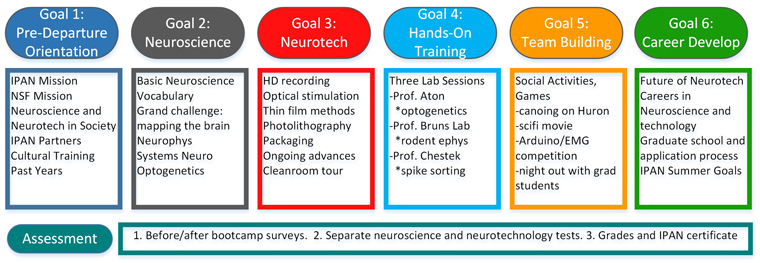Program Overview
Developing neurotechnology to study the brain is a long-term mission that will be active for many decades and perhaps even centuries from now. Educating the next generation of neuroscientists and engineers in novel ways is one of IPAN’s primary missions. Attracting and retaining more science and technology majors in this exciting area of research is an important opportunity for us all. Each of our programs will benefit in the short-term from the fresh international perspectives that the students will bring to the research effort, while the entire scientific community will benefit long-term from the investment in next-generation thought leaders.
IPAN Summer Bootcamp
Every summer, twelve undergraduate and graduate students from U.S. Universities are selected from a highly competitive applicant pool to undergo a five-day neuroscience bootcamp at the University of Michigan, prior to traveling abroad to a collaborating institution for a summer research experience.
Application for IPAN 2020 closed on January 31, 2020.
IPAN Scholar bootcamp curriculum overview:

IPAN Research Experience for Undergraduates Program
The IPAN program provides hands-on experiential learning for undergraduate students interested in research and neuroscience. Applicants can choose from a variety of available projects and get experience working directly with faculty and research staff.
Selected US students will begin the program with a 1 week cultural, neuroscience, and neurotechnology primer led by faculty.
Students will be assigned their research location by NSP IPAN Directors and IPAN SURE Partners and may not request a specific research location. 2020 programs will be offered in three locations:
- University of Freiburg – a public research university in Freiburg, Germany
- Korea Institute of of Science and Technology – a multi-disciplinary research institute located in Seoul, South Korea
- University of Hamburg, Germany – a comprehensive university in Hamburg, Germany
No background in German or Korean necessary.
Research Exchange Program
Students and post-docs from each participating U.S. laboratory are selected by faculty to travel abroad (1 per year per laboratory, 15 total). Each research partner commits to sending a student researcher abroad for 10-12 weeks to engage in a pre-defined collaboration based on project needs. Cross-training between technology and neuroscience laboratories is required for at least half of these exchanges.
- Undergraduate training includes material standard to other Undergraduate Research Opportunity Programs (UROP), as well as a description of the challenges of neuroscience and neurotechnology at an appropriate level, while conveying the motivation behind the research.
- Graduate-level material teaches neuroscientists the basics of fabrication of microsystems and optics (with some material found in EECS 414, 425, 429) with a focus on implantable biosensors, amplification, electromagnetic noise interference, and optoelectronics.
- For technologists, material is provided to teach systems neuroscience including spike clustering, cell-type identification, and localization. Classic neuroscience experiments and hypotheses are presented to ensure common frames of reference.
 MENU
MENU 
